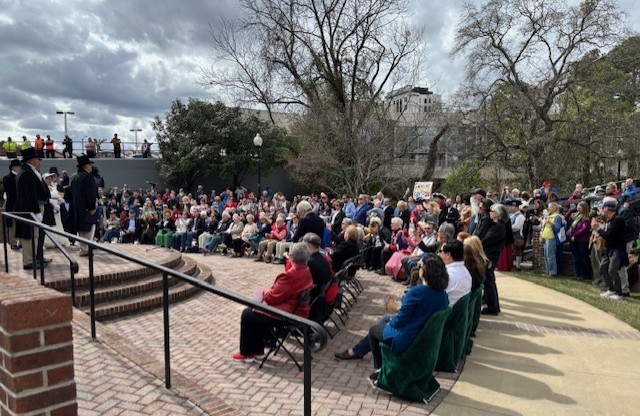Often attributed to Mark Twain — perhaps mistakenly, since no historical source shows he actually made the statement — “History doesn’t repeat itself, but it often rhymes” is a common and apt refrain when discussing the connection between historical perspectives and current events. By drawing on knowledge of what happened in the past, and why, we are better able to understand the flow and direction of the history collectively created in each new day.
“Past Rhymes With Present Times” is a series by Lloyd S. Kramer exploring historical context and frameworks, and how the foundations of the past affect the building of the future.
The most popular Frenchman in the American Revolution and throughout our nation’s later history was Gilbert du Motier de Lafayette (1757-1834), whom Americans are honoring this year at special events to commemorate the 200th anniversary of his celebrated return to the United States in 1824-25.
Famous foreigners have often attracted large American crowds, but neither the Beatles nor the Rolling Stones nor Winston Churchill could ever match the popular response that Lafayette elicited from the vast throngs who welcomed him to each of America’s 24 states between August 1824 and September 1825.

A re-enactment of Lafayette’s visit to Fayetteville on March 4-5, at a celebration event held on the same days in 2025. (photo via Lloyd Kramer)
Hailed as the “Nation’s Guest” during parades and parties in every city he visited, Lafayette addressed a joint session of the US Congress, toured Revolutionary War battlefields with military veterans, and greeted countless government officials, teachers, students, farmers, urban workers, and “common people” of all races and generations who wanted to shake his hand.
The Lafayette Party in 2025
You may be so focused on recent political upheavals or on the problems of daily life that you’ve missed the bicentennial “Lafayette parties” which have attracted celebrating crowds since last August in New England, New York, Pennsylvania, and Virginia. The celebrations also came to North Carolina this month in Halifax and Raleigh, but the recent reenactment of Lafayette’s visit and “Farewell Tour Ball” in Fayetteville on March 4-5 (the dates he stopped there in 1825) may have drawn the most enthusiastic celebrants–perhaps because in 1783 our state’s General Assembly designated Fayetteville as the first American town to carry Lafayette’s name.
North Carolina was thus on the leading edge of a “civic identity” movement that ultimately gave Lafayette’s name to more than 90 American towns, counties, and townships. No other foreigner has been honored with so many place names or with so many similar recognitions in “Lafayette” streets, squares, parks, and schools across the whole United States.
Why have Americans named their towns or streets for Lafayette and why are they still celebrating his life and ideas in 2025? These questions lead us back to Lafayette’s actions during the Age of Revolutions in America and France, but the bicentennial celebrations of his nineteenth-century tour also remind us that his political ideas and courage challenge the current authoritarian assault on the institutions that sustain American democracy.
Lafayette’s commitment to universal human rights, his efforts to abolish slavery, his respectful engagement with Native Americans, his support for the constitutional rule of law, and his firm resistance to Napoleon Bonaparte’s authoritarian regime make him a still-relevant “hero in two worlds.” In other words, Lafayette should be remembered wherever people are looking for historical allies in their struggles against the most self-obsessed, anti-Constitutional president in American history.
Lafayette’s life, Ideas, and Public Actions
The people of Fayetteville therefore have good reasons to celebrate the man for whom their city is named. Coming from France at age 19 to join the American Revolution in 1777, Lafayette gained the trust and affection of George Washington, helped to mediate the transatlantic alliance that brought a French army into the war, and led American troops in the Virginia Campaign that trapped British forces at Yorktown for the decisive French-American military victory in 1781.
Americans appreciated Lafayette’s freely given service to their revolutionary war and his shared belief that all human beings are endowed with certain “unalienable rights,” but they also admired the unpretentious, personal style that made him a good listener rather than an arrogant European Marquis.
Lafayette returned to France in the 1780s and became an active, abolitionist opponent of both the slave trade and slave-based economic systems. He also became a leader of the French Revolution in 1789, when he introduced the first proposal for a “Declaration of the Rights of Man and Citizen” and served as the first commander of the Parisian National Guard.
His political defense of a liberal, Constitutional Monarchy, however, enraged Right-wing royalists as well as Left-wing critics of kingship and forced Lafayette to flee to the Netherlands, where he was captured by Austrian troops and dispatched to an isolated prison in Moravia.
Although Napoleon Bonaparte eventually negotiated Lafayette’s release from a five-year imprisonment and allowed him to live again in France, he soon turned firmly against Napoleon’s despotic governmental policies. In other words, Lafayette became a “Never Bonapartist.”
Lafayette and Napoleon
Napoleon and his obedient ministers tried to recruit Lafayette into a Conservative Senate that gave Napoleon a façade of public support by dutifully approving his self-serving, authoritarian policies. But Lafayette refused this offer and another proposal for him to serve as French ambassador to the United States, choosing instead to remain isolated at a country chateau called La Grange.
Lafayette’s letters to American friends complained that Napoleon rejected the ideas and constitutional systems he had fought to establish in both America and France. “The Rights of Men Have Become in the old World Quite Unfashionable,” Lafayette explained to Thomas Jefferson in one of his early critiques of Bonaparte’s self-aggrandizing methods of government.
When Napoleon claimed that national plebiscites had given him a mandate to be crowned the emperor of France, Lafayette expanded his critique: “I am willing to be prudent but not to be an Apostate,” he wrote in another letter to Jefferson, but “to an absolute Government I could not be a Friend.” Surveying the damage of Napoleon’s autocratic actions, Lafayette lamented that “I feel an almost insurmountable disgust.”
Lafayette nevertheless survived the emperor’s final military defeat at Waterloo and returned to public life in France’s post-Napoleonic Chamber of Deputies, until an electoral defeat in 1824 coincided with President James Monroe’s invitation for a visit to the United States. Seeking to show American opposition to a resurgent European conservatism, Monroe invited the liberal Lafayette to make the nationwide tour that the “Friends of Lafayette” are retracing and celebrating again in their present-day commemorations.
Although he traveled through American towns while the supporters of John Quincy Adams and Andrew Jackson waged a bitter presidential campaign, Lafayette avoided the polarizing political anger by praising America’s exceptional success in winning its revolutionary war and in establishing its constitutional system to protect freedom through the rule of law (except for the immoral contradictions of slavery and Native American displacements).
In contrast to the older European nations, he noted during a typical speech at Independence Hall in Philadelphia, Americans had launched “the era of a new and of the only true social order founded on the unalienable rights of man.” These principles had brought “happiness and prosperity” to America, as Lafayette also emphasized in other speeches that confirmed the early nationalist belief in American exceptionalism. The constitutional basis of American laws and freedoms, in short, provided stark political alternatives to the self-referential authoritarianism that Lafayette had seen in Napoleonic France.
Trump and Napoleon
The stream of provocative messages from the Trump administration can drown even the most detached American reader, but Trump’s Napoleonic-style declaration on his social media platform in February carried the usual provocations into the most explicit autocratic claim: “He who saves his Country does not violate any Law.” The quotation was drawn from a movie (Waterloo, with Rod Steiger playing Napoleon) rather than from a verified Napoleonic statement, yet the Bonapartist ghost has clearly entered Trumpism’s real-world ambitions.
Like Napoleon’s regime in France, America’s current presidential administration suppresses government agencies it doesn’t like, removes people who challenge the leader’s policies, and ignores legislative or legal constraints on the autocratic uses of state power. This “Napoleonic moment” in the United States may therefore generate new appreciation for Lafayette’s resistance to Bonaparte’s despotism.
Lafayette noted in a memoir about Napoleon and the emperor’s sycophantic ministers that he might have accepted a government position “if the regime had been more open to the principles of liberty and the interests of my country…. But I was not able to approve of an arbitrary government or associate myself with it.” He also wrote a courageous letter to Napoleon himself to assert that he could only affiliate with governing systems that were based “on principles, on commitments, and on actions I have supported throughout my entire life.”
Such principled opposition must have seemed strange to a self-serving, autocratic leader who focused on his own power. Napoleon never responded to this defiant letter, but the silence did not surprise Lafayette. As he wrote in another critique of Napoleon’s self-obsessed actions, “the more he advanced in his catastrophic conduct, the more this rupture became inevitable… [because] the creed of liberty should be preserved unequivocally.”
Lafayette and the Resistance to Autocracy
Each authoritarian leader emerges from different historical contexts and pursues different self-serving policies to consolidate autocratic power. The seizure of power, however, always requires the acquiescence of cautious people as well as the disruptive actions of aggressive autocrats. Most would-be critics of authoritarianism gradually accept the new policies and the ideological propaganda that justifies them, or they fearfully withdraw into the silence of internal exile.
These familiar patterns of public silence show why Lafayette’s lifelong actions exemplify enduring alternatives to passivity for anyone who supports national struggles (as in Ukraine) against imperialist invaders and defends democratic institutions against modern authoritarianism.
When American troops went to France in 1917 to fight a war against Germany that was to “make the world safe for democracy,” General John J. Pershing announced at Lafayette’s Parisian gravesite that Americans had come to repay his unflinching service to their own nation’s struggle for political freedom and constitutional government.
This renewal of the earlier French-American alliance led to another military victory, but the campaign for democracy never ends. Lafayette’s resistance to Napoleon thus provides historical precedents for the ongoing struggle against autocratic leaders; and those who support pro-democracy movements can join with earlier generations and with Americans who are now celebrating Lafayette’s famous 1824-25 tour to declare again: “Lafayette, we are here!”

Photo via Lindsay Metivier
Lloyd Kramer is a professor emeritus of History at UNC, Chapel Hill, who believes the humanities provide essential knowledge for both personal and public lives. He has recently published “Traveling to Unknown Places: Nineteenth-Century Journeys Toward French and American Selfhood,” but his historical interest in cross-cultural exchanges also shaped earlier books such as “Nationalism In Europe and America: Politics, Cultures, and Identities Since 1775” and “Lafayette in Two Worlds: Public Cultures and Personal Identities in an Age of Revolutions.”

